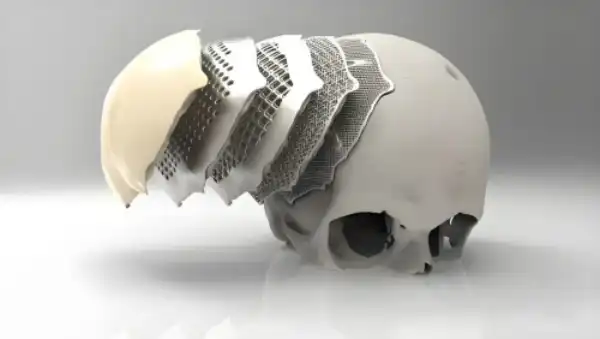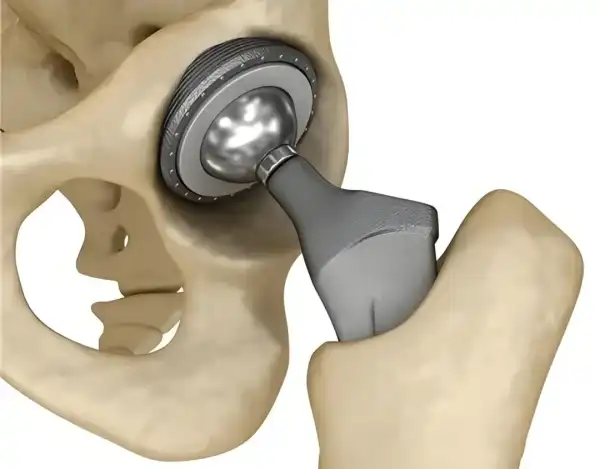Avascular necrosis is a bone disease that occurs when the blood supply to the femoral head (the top of the thighbone that forms the hip joint with the acetabulum) is interrupted, causing bone cell death and ultimately affecting bone structure and function. Avascular necrosis can be caused by a variety of factors, including long-term use of high-dose hormones, alcoholism, severe trauma (such as hip fracture or dislocation), blood diseases, and radiation therapy. Symptoms usually include hip pain and limited function, and in severe cases can lead to femoral head collapse and arthritis. One solution is to replace the necrotic bone. Situations that require bone replacement of bones or joints (such as bone transplants or artificial joint replacements, which are the applications of titanium alloys in orthopedics) are usually related to the following diseases or conditions: Avascular Necrosis (AVN), bone tumors, severe osteoarthritis, rheumatoid arthritis, congenital hip dysplasia, chronic osteomyelitis, and Paget's disease. In my country, there are more than 6 million patients with bone defects each year due to congenital diseases, trauma, aging, and the need to improve the quality of life. However, the actual number of orthopedic surgeries using bone defect repair materials is only about 1.33 million annually and many unmet needs exist. However, only a handful of hospitals in China use 3D printing technology to make bones or joints, and the price is expensive, which is unaffordable for ordinary people. In addition to the technical barriers of 3D printing titanium alloys, the price of 3D printing machines and equipment is even more expensive. The only way to replace 3D printing to make bones or joints is by machining.

Of course, today we will not talk about medicine, but the application of titanium alloys in orthopedics. It is not limited to traditional joint replacement and internal fixation surgery but also extends to more complex and personalized treatment plans. It is one of the indispensable materials for modern orthopedic treatment. Titanium alloys are widely used in the field of orthopedics, thanks to their unique biological properties and mechanical properties, which make them ideal materials for manufacturing orthopedic implants. Titanium alloys have many advantages:
1. Biocompatibility: Titanium alloys have good biocompatibility, which means that they can coexist well with human tissues and are not prone to allergic or rejection reactions. This property allows titanium alloy implants to remain stable in the body for a long time and reduces the risk of complications.
2. Strength-to-weight ratio: Titanium alloys have high strength and relatively low density, which allows them to provide sufficient support while reducing the burden on patients. They are particularly suitable for making implants such as hip and knee prostheses, spinal fixation nails, and plates.
3. Corrosion resistance: Titanium alloys have excellent corrosion resistance in the body environment, can effectively resist corrosion from body fluids, and extend the service life of implants.
4. Osseous integration ability: Certain titanium alloy surface treatment technologies, such as sandblasting, acid etching, or coating with hydroxyapatite coating, can promote the growth of bone cells directly on the surface of titanium alloys. The application of titanium alloys in orthopedics achieves bone integration and enhances the stability of implants.
5. Elastic modulus matching: The elastic modulus of titanium alloy is close to that of human bone, which means that its behavior under stress is closer to real bone, reducing the stress shielding effect caused by the difference in elastic modulus between the material and the bone, and reducing the risk of osteoporosis or degeneration of adjacent bones.

Shape memory properties: Some titanium alloys have shape memory effects, which are very useful in specific orthopedic applications, such as absorbable nails and memory alloy fixation devices, which can restore the preset shape under certain conditions to help accurately fix the fracture site.
Customized implants: With the development of 3D printing technology, titanium alloys can be used to manufacture personalized orthopedic implants, such as joint prostheses or bone defect fillers customized according to the patient's anatomical structure, which improves the accuracy of surgery and the adaptability of implants.
Some people may feel that the application of titanium alloys in orthopedics is far away from our lives. Did you know that China has the largest elderly population in the world? Recent data show that the number of elderly people aged 60 and above in China has reached about 264 million, accounting for 18.70% of the total population; and the number of elderly people aged 65 and above has reached about 191 million, accounting for 13.50% of the total population. (From 2001 to 2021), the proportion of the elderly population aged 65 and above has exceeded 14%, entering the deep aging stage. With the development of science and technology and the continuous improvement of processing technology, perhaps one day in the future, bones and joints made using CNC machining centers may enter our lives.
Bone products often require highly precise size and shape, especially medical implants such as joint prostheses. Use technologies such as high-precision CNC machining, 3D printing, or precision casting to ensure accurate matching with real bones.
Surface treatment: Surface finish and treatment are particularly important for implants to promote bone integration or reduce friction. Polishing, sandblasting, acid etching or coating treatment (such as hydrophilic coating, or antibacterial coating) may be required.
Biocompatibility and toxicity testing: Any material used in the human body must pass strict biocompatibility testing to ensure that it does not cause rejection or toxic effects. Follow ISO and relevant national medical device standards.
For the application of titanium alloys in orthopedics, the products need to be sterilized after final assembly, select appropriate sterilization methods (such as ethylene oxide sterilization, and radiation sterilization), and use sterile packaging. Establish a strict quality control system, conduct comprehensive testing of raw materials, processing, and finished products, and implement batch traceability management. Ensure that the product design, production, and sales processes comply with local laws, regulations, and industry standards, such as CE mark (Europe), FDA approval (USA), etc. In applications involving human models or specific individual data, ensure compliance with privacy protection and ethical review standards. Email:linhui@lhtitanium.com











